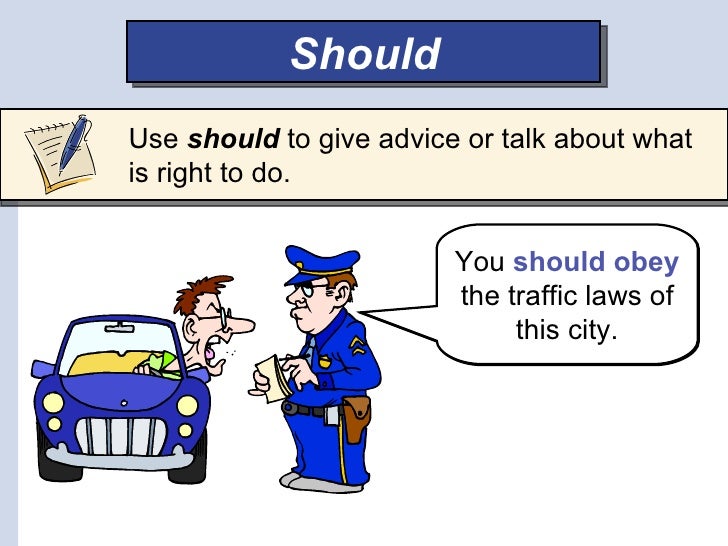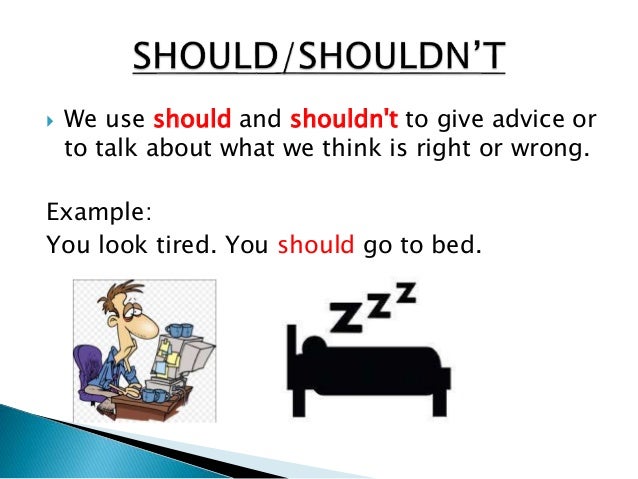SHOULD/ SHOULDN´T HAVE
El segundo verbo modal es should. Es muy importante dominarlo, ya que es una de las palabras que más oirás y utilizarás en inglés.
Should se utiliza para recomendar hacer algo y para afirmar si nos parece que algo es como debería ser o no.
La teoría
Como todos los verbos modales, should va acompañado del infinitivo del verbo principal sin to.
- You should get some more sleep.
- The world should be.
Para formar la negación se añade not después de should y, al contrario que en el caso de might, casi siempre se contrae en la forma negativa.
Te recordamos que los verbos modales no toman la s en la 3ª persona del singular ni adoptan una forma diferente en tiempos pasados ni se combinan con el auxiliar do en preguntas o negaciones.
La práctica
Pronuncia /shhhuud/ en las siguientes frases.
Deberías hacer algo respecto a tu pelo, cariño.
|
You should do something about your hair, darling.
|
En mi opinión, deberías ocuparte de ello ahora mismo.
|
I think you should see to it right now.
|
Todo el mundo debería tener un sitio donde vivir.
|
Everyone should have a place to live.
|
En estos ejemplos verás /shhhuudnt/, el sonido de la negación contraída.
No deberías preocuparte tanto sobre lo que piensa la gente.
|
You shouldn’t worry so much about what people think.
|
No debería ver películas de miedo; me dan pesadillas.
|
I shouldn’t watch horror films; they give me nightmares.
|
Encontrar un trabajo decente no debería ser una misión imposible.
|
Finding a decent job shouldn’t have to be mission impossible.
|
Fíjate en como empieza la primera pregunta: /shhhúdai/.
¿Debería quedarme o irme?
|
Should I stay or should I go?
|
¿No debería (él) ir al médico?
|
Shouldn’t he see a doctor?
|
¿Crees que debería sincerarme?
|
Do you think I should come clean?
|
Extra
Clave de pronunciación
Cuando digas should, debería sonar a /shhhuud/. El sonido inicial es como si estuvieras mandando callar.
Error común
Aunque should y must significan deber en castellano, tienen sentidos muy distintos. Fíjate: A good student should study hard (Un buen alumno debe(ría) estudiar mucho) y A Vaughan student must study hard (Un alumno Vaughan debe estudiar mucho).
Consejo clave
Ten en cuenta que en estos artículos trabajarás los usos más comunes de inglés, y no explicaciones gramaticales exhaustivas. De esa forma, añadimos que también usamos should en frases tipo: That shouldn’t be a problem, en el sentido de que hay poca probabilidad de que eso sea un problema.
Was and were are both past tenses of the verb to be. The verb be is a tricky one because it is an irregular verb and one that we find ourselves using with great frequency, so it is that much more important that we choose the correct verb for our sentences.
In this post, I want to go over the grammar behind was vs. were, when it’s correct to use which one, and give you a few tips to keep track of them both. After reading this post, you shouldn’t have any trouble correctly choosing between was or were in your future writing.
WAS/WERE GOING TO AND WAS/WERE SUPPOSED TO
As I said above, was and were are in the past tense, but they are used differently.
Was is used in the first person singular (I) and the third person singular (he, she, it).
Were is used in the second person singular and plural (you, your, yours) and first and third person plural (we, they).
The forms that was and were will take in your sentence are summarized in the chart below,
Singular = I was, You were, He was, She was, It was
Plural = We were, You were, They were
- I was driving to the park.
- You were drinking some water.
- He was about to eat dinner.
- She was at the roller rink.
- It was a great time.
- We were in the right spot.
- They were nowhere to be seen.
If I was vs. If I were
While some people get mixed up on what we’ve covered above, most of the confusion with these two words centers on the use of the subjunctive mood and specifically the two phrases if I was vs. if I were. For example, which of the following two choices is correct?
- If I was a better cook, I could entertain more.
-or-
- If I were a better cook, I could entertain more.
You hear people say both each and every day, so it’s hard to know which is correct. The answer, however, has to do with the subjunctive mood.
Subjunctive Mood
The subjunctive mood is a verb form that is used for unreal or hypothetical statements. It is made up of the phrases I were, he were, she were, it were, etc. You often use this form when you are being wishful. For example,
- I wish I weren’t so shy.
- I wish it were warmer outside.
- If I were taller, I could dunk a basketball.
- If John were a rich man, he could drive a fancy car.
- He acts as if he were the one in charge.
- John spends money as if he were a millionaire.
All of the above sentences use the verb were because they aren’t true; they do not describe reality.
In the first two sentences, I am talking about things I wish would happen.
In the third and fourth sentences, I am talking about situations that would happen if I were taller and if John were rich, speaking hypothetically.
And the fifth and sixth sentences are examples of unreal statements.
When to Use Were
Another good example of the subjunctive mood can be found in the musical Fiddler on the Roof. In the song, “If I were a rich man,” the character Tevye sings about how different his life would be and all the things he would do if he were rich.
If I were a rich man, I’d build a big tall house…
If I were a rich man, I’d have the time that I lack.
If I were a wealthy man, I wouldn’t have to work hard.
In these lines, Tevye is fantasizing about life as a wealthy man. He isn’t rich now; he’s just imagining it, so we need to use the subjective “If I were,” not “If I was.”
The correct answer for the example above, therefore, is, “If I were a better cook, I could entertain more.”
Tricks to Remember
Two good clues for the subjunctive mood are the words if and wish. If you see either of these words, there is a good chance you will need to use the subjunctive.
When to Use Was
Since were is used for statements that do not describe reality, was is just the opposite. Was is used for statements of fact. For example,
- Last night, I was watching TV until midnight.
- When I was younger, I wanted to be a singer.
- Your brother was my college roommate.
Summary
These words are used differently in sentences, so it’s important to know when to use were vs. was.
Was is used in the first and third person singular past. It is used for statements of fact.
Were is used in the second person singular and plural and first and third person plural. It is used in the subjunctive mood to indicate unreal or hypothetical statements. The words if and wish usually indicate the subjunctive mood.







No hay comentarios:
Publicar un comentario